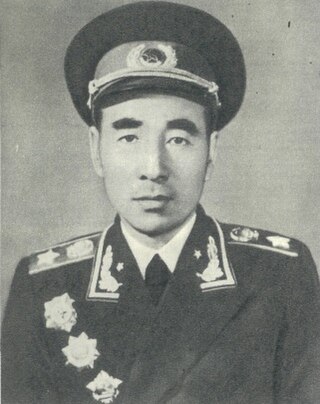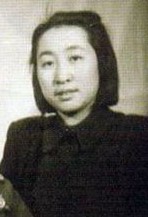
The Gang of Four was a Maoist political faction composed of four Chinese Communist Party (CCP) officials. They came to prominence during the Cultural Revolution (1966–1976) and were later charged with a series of treasonous crimes due to their responsibility for the excesses and failures in the Cultural Revolution. The gang's leading figure was Jiang Qing. The other members were Zhang Chunqiao, Yao Wenyuan, and Wang Hongwen.

Jiang Qing, also known as Madame Mao, was a Chinese communist revolutionary, actress, and political figure. She was the fourth wife of Mao Zedong, the Chairman of the Communist Party and Paramount leader of China. Jiang was best known for playing a major role in the Cultural Revolution as the leader of the radical Gang of Four.

Lin Biao was a Chinese politician and Marshal of the People's Republic of China who was pivotal in the Communist victory during the Chinese Civil War, especially in Northeast China from 1946 to 1949. Lin was the general who commanded the decisive Liaoshen and Pingjin campaigns, in which he co-led the Manchurian Field Army to victory and led the People's Liberation Army into Beijing. He crossed the Yangtze River in 1949, decisively defeated the Kuomintang and took control of the coastal provinces in Southeast China. He ranked third among the Ten Marshals. Zhu De and Peng Dehuai were considered senior to Lin, and Lin ranked directly ahead of He Long and Liu Bocheng.

Ye Jianying was a Chinese Communist revolutionary leader and politician, one of the Ten Marshals of the People's Republic of China. He was the top military leader in the 1976 coup that overthrew the Gang of Four and ended the Cultural Revolution, and was the key supporter of Deng Xiaoping in his power struggle with Hua Guofeng between 1978 and 1981, which ended in Hua fading into political obscurity. In his capacity as Chairman of the Standing Committee of the National People's Congress, Ye served as China's head of state from 1978 until 1983.

Chen Boda, was a Chinese Communist journalist, professor and political theorist who rose to power as the chief interpreter of Maoism in the first 20 years of the People's Republic of China. Chen became a close associate of Mao Zedong in Yan'an, during the late 1930s, drafting speeches and theoretical essays and directing propaganda.

Lin Liheng, commonly known by her nickname Lin Doudou, is the daughter of Chinese marshal Lin Biao and his second wife Ye Qun. As the child of a prominent Chinese military and political leader, Lin was given minor but important positions during her youth. During the Cultural Revolution, she served as the deputy editor-in-chief of the newspaper of the People's Liberation Army Air Force. However, following her father's death and subsequent denouncement by the Chinese Communist Party (CCP) in 1971, Lin was stripped of her positions and detained indefinitely.
Events from the year 1971 in China.

Project 571 was the code name given to an alleged plot to execute a coup d'état against Chairman Mao Zedong in 1971 by the supporters of Lin Biao, then Vice Chairman of the Chinese Communist Party. In Chinese, the numbers "5-7-1" sound very similar to the term 'armed uprising'. The Chinese Communist Party initially claimed that Lin Biao himself had devised Project 571, but evidence inside and outside of China has made it more likely that Lin's son, Lin Liguo, a high-ranking officer in the People's Liberation Army Air Force, instead developed the plot. Any plots that may have been planned or attempted by Lin Biao or his family ultimately failed. Lin's family attempted to flee China for the Soviet Union, but died when their plane crashed in Mongolia on September 13, 1971. A draft copy of the Project 571 outline was discovered following Lin's death, and was publicly circulated by the Chinese government as a means of explaining the event.

Li Desheng was a general in the Chinese People's Liberation Army. He was born in Xin County, Henan, China, an area now known as the "Cradle of Generals" for the large number of senior military officers born in the region. He joined the Chinese Workers' and Peasants' Red Army at the age of 14, in 1930, the Communist Youth League in 1931, and the Chinese Communist Party a year later. He attained the rank of major general in 1955, and general in 1988. The patterns of Li's advancement suggest that he was mentored by Chen Xilian, and that he was closely aligned with You Taizhong. Li Desheng served on the Politburo of the Chinese Communist Party from 1969–1985, one of the most turbulent periods of the People's Republic. He died in Beijing on 8 May 2011.

Lin Liguo was the son of Chinese marshal Lin Biao. He was the alleged leader of Project 571, a coup plot against Chinese Communist Party chairman Mao Zedong.
The 14th Central Committee of the Chinese Communist Party was in session from 1992 to 1997. It held seven plenary sessions. It was preceded by the 13th Central Committee. It was elected by the 14th National Congress of the Chinese Communist Party and in turn elected the 14th Politburo of the Chinese Communist Party.
The 11th Central Committee of the Chinese Communist Party was in a five-year session from 1977 to 1982. The 10th Central Committee of the Chinese Communist Party preceded it. It held seven plenary sessions in the five-year period. It was formally succeeded by the 12th Central Committee of the Chinese Communist Party.
The 9th Central Committee of the Chinese Communist Party was in session from 1969 to 1973. It was preceded by the 8th Central Committee of the Chinese Communist Party. It was the second central committee in session during the Chinese Cultural Revolution. Even amidst partial cultural disintegration, it was succeeded by the 10th Central Committee of the Chinese Communist Party. It held two plenary sessions in the 4-year period.
The 8th Central Committee of the Chinese Communist Party was in session from 1956 to 1969. It was preceded by the 7th Central Committee of the Chinese Communist Party. It held 12 plenary sessions in this period of 13 years. It was the longest serving central committee ever held by the Communist Party.
The 7th Central Committee of the Chinese Communist Party was in session from 1945 to 1956. It was a product of the convening of the 7th National Congress of the Chinese Communist Party. It held six plenary sessions in this 11-year period. It began in June 1945, before the end of the Second Sino-Japanese War, and the resumption of the Chinese Civil War. This committee would be succeeded by the 8th Central Committee.
The Central Case Examination Group was a special organization established in the People's Republic of China in 1966 under the aegis of the Politburo Standing Committee of the Chinese Communist Party to persecute those accused of "anti-party activities". It was, in essence, an organization dedicated to political persecution of senior party leaders as well as ordinary functionaries. Initially conceptualized as a beachhead by Chairman Mao Zedong's most radical supporters to 'gather dirt' on opponents of the Cultural Revolution, it later began taking up cases against all manner of perceived political opponents irrespective of their ideological allegiance. Many of its early leaders, such as Jiang Qing, later themselves became the subject of persecution by the Group. The Group was compared by Cultural Revolution-era propagandist Wang Li to the Soviet Cheka, but he noted that the CCEG had even broader powers. Its leading members included nearly all of the members of the Cultural Revolution Group (CRG) as well as Premier Zhou Enlai and the chief of Mao's security detail Wang Dongxing. The CCEG worked closely with the CRG during its investigations.
Wu De, born Li Chunhua (李春华), was a Chinese Communist revolutionary and politician of the People's Republic of China. He served in provincial-level leadership positions in Pingyuan Province, Tianjin municipality, Jilin Province, and Beijing municipality, and was a member of the Politburo of the Chinese Communist Party from 1973 to 1980. After the Cultural Revolution, Wu was a key supporter of Hua Guofeng and was forced out of politics after Deng Xiaoping ousted Hua from his leadership position.

The Lin Biao incident was an aircraft accident at 3 a.m. on 13 September 1971 involving Lin Biao, the Vice Chairman of the Chinese Communist Party. Everyone on board the Hawker Siddeley Trident, including Lin and several members of his family, died when the aircraft impacted Mongolian terrain. Lin Biao was allegedly attempting to defect to the Soviet Union after a failed plot to assassinate Mao Zedong. Following Lin's death, there has been widespread skepticism in the West concerning the official Chinese explanation, while forensic investigation conducted by the USSR, that recovered the bodies following the crash, has confirmed that Lin was among those who died in the crash.

Qiu Huizuo was a lieutenant general of the People's Liberation Army (PLA), best known as one of the "four guardian warriors" of Vice Chairman Lin Biao during the Cultural Revolution. Qiu rose through the ranks of the PLA during the civil war between the Chinese Communist Party and the Kuomintang. He took charge as the PLA logistics chief in 1959, and was persecuted at the beginning of the Cultural Revolution. He was later rehabilitated owing to the blessing of Zhou Enlai and Lin Biao, and elevated to the Politburo of the Chinese Communist Party in 1969. In return, he helped to persecute Lin's enemies and consolidate Lin's power in the PLA. After Lin's flight and death in 1971, Qiu was purged and sentenced to 16 years in prison.

The 10th National Congress of the Chinese Communist Party was held in the Great Hall of the People, Beijing, between August 24 and 28, 1973. 1,249 delegates represented the party's estimated 28 million members. It was preceded by the 9th National Congress and was succeeded by the 11th National Congress.














